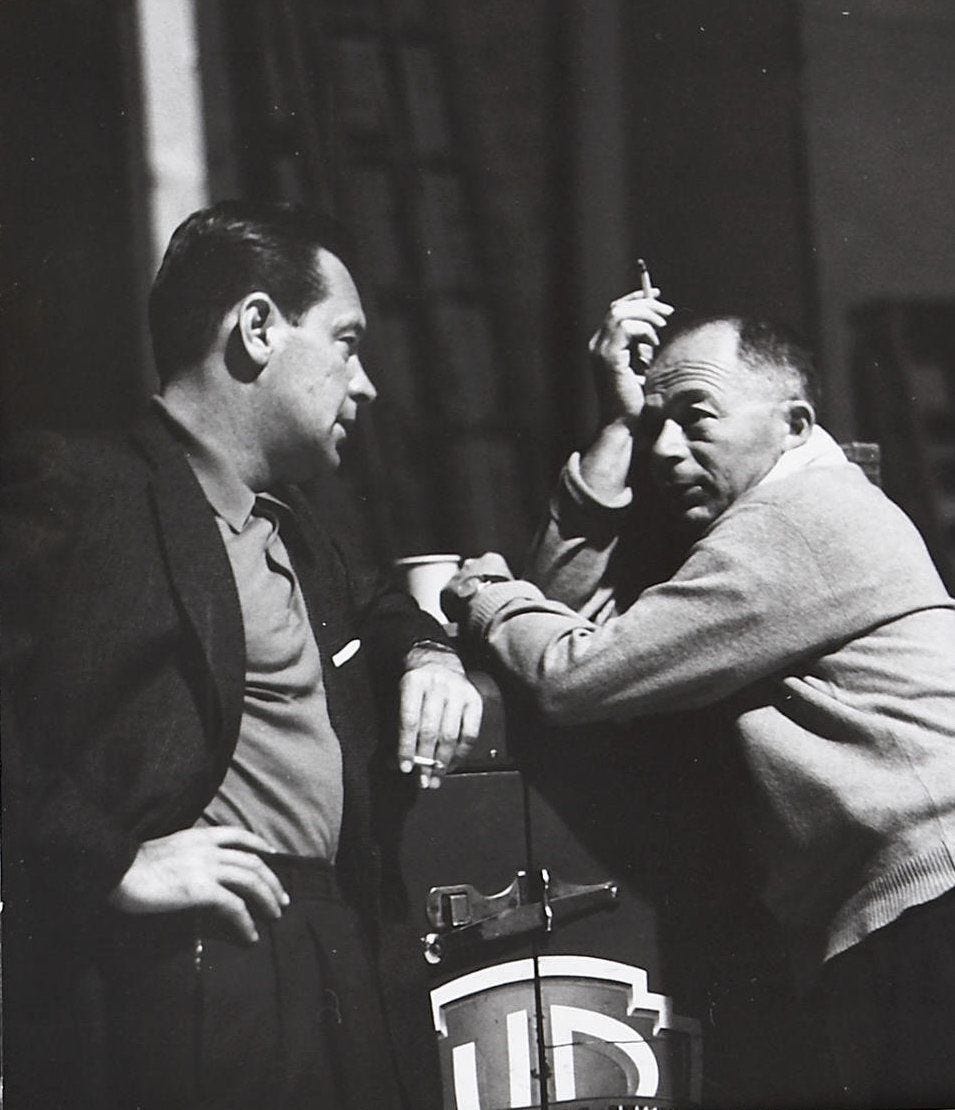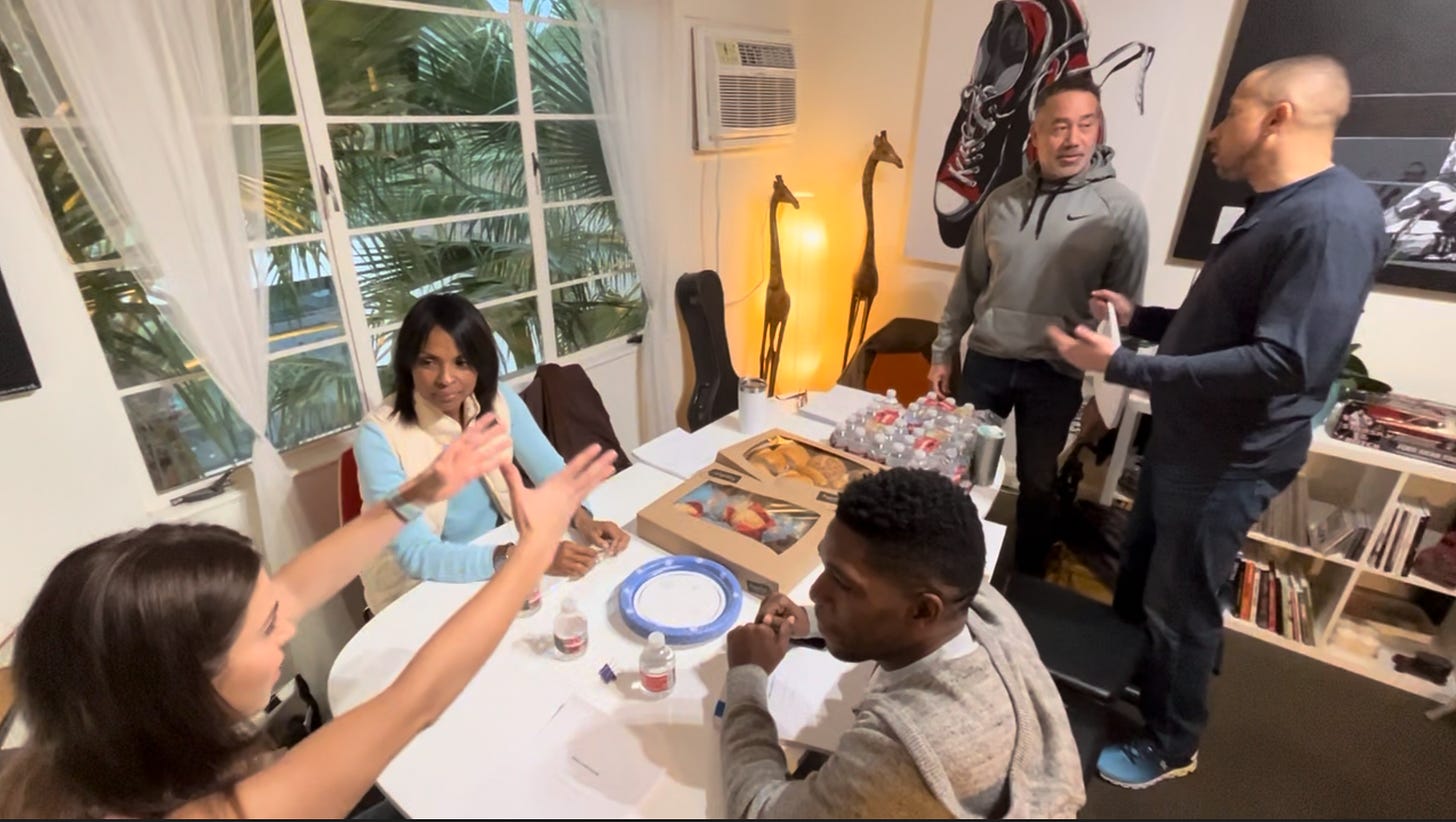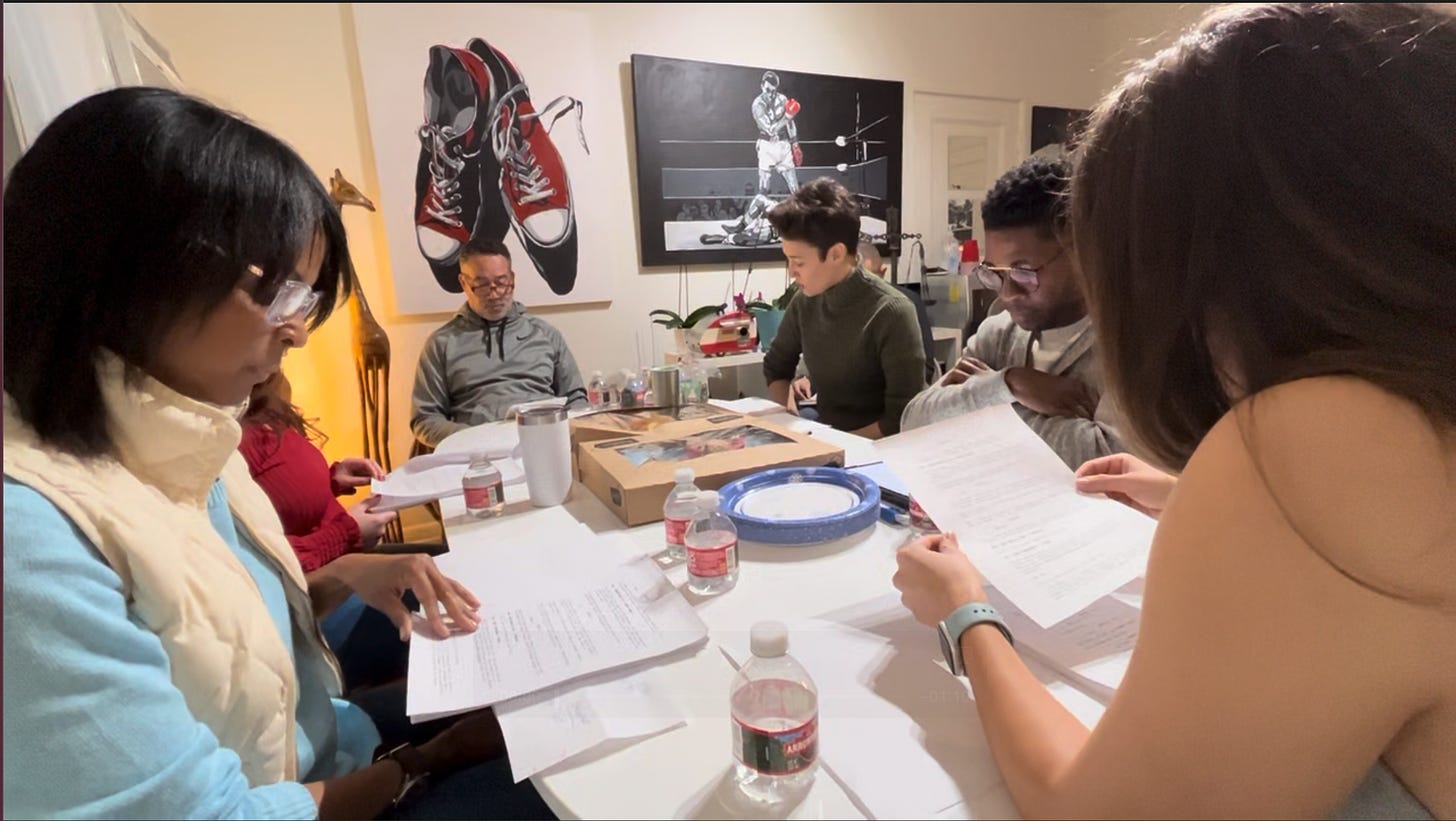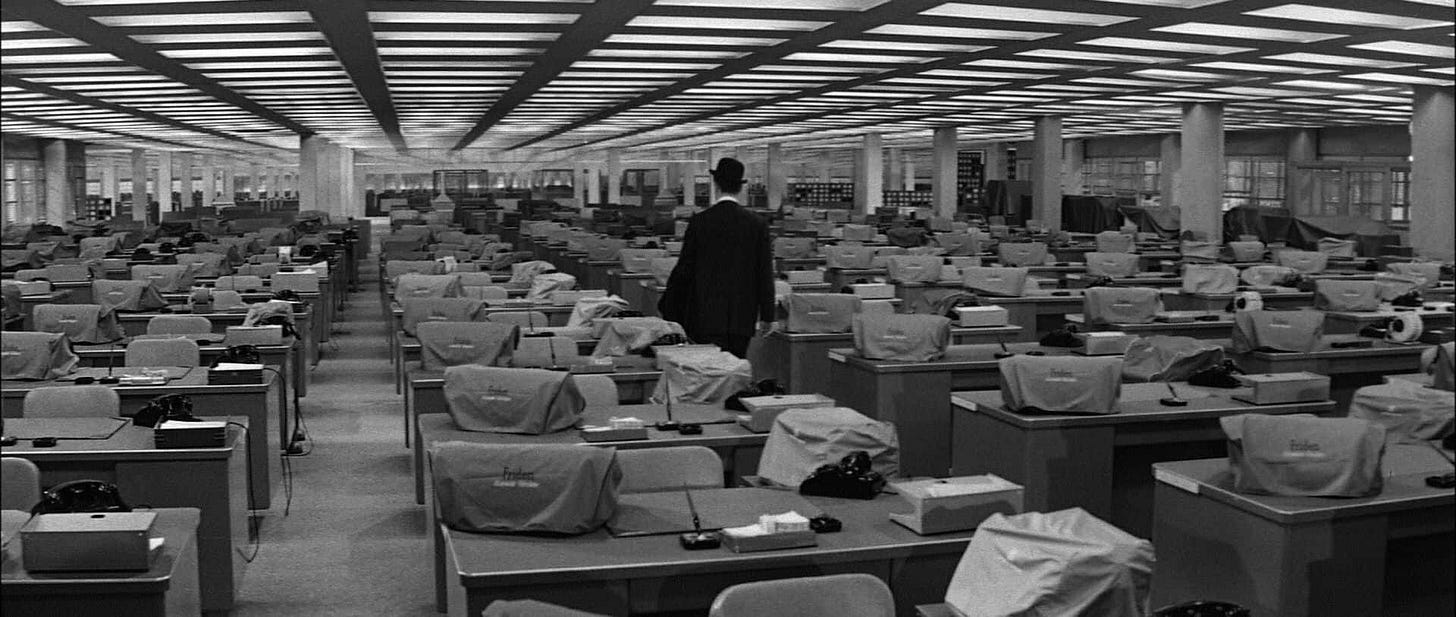How to Get Ahead of 95% of Screenwriters
In 2018, screenwriter Ed Solomon dropped a Tweetstorm dubbed, "Things You Will Do That Will Keep Me Working", a bit of tough love on why nascent screenwriters struggle to emerge from the pack.
Hello from Hancock Park. Still in the shadow of Paramount Pictures.
I survived the fires unscathed… but it was murder on my mental state.
For those of you who are new (and there are a quite a bit of you, thanks to Cole Haddon!) THIN ICE was born out of my frustration during the 2023 WGA Strike. It was sort of an on-going, slow-rolling eulogy about the contraction/near-collapse of the film & TV biz.
But THIN ICE has a different mandate (but there will still be the occasional sharp barb about the status of the Industry). It’s more about creativity, creative journeys, and a carving out a creative live in a world where Tech Bros continue to devalue what it means to be human.
Although Twitter has devolved into a fascist-amplifying shit show (you’ll never catch me calling it by the name the South African immigrant rechristened it), there was a time when Twitter was cool place for idea exchange, and I’ve been returning to my bookmarks to migrate various tweets to a less atrocious archive.
I came across this Tweetstorm by screenwriter Ed Solomon (NO SUDDEN MOVE, BILL & TED’S EXCELLENT ADVENTURE, MEN IN BLACK ) from 2018.
Ed was dispensing some tough love writing advice to new/novice screen & TV writers (remember this was back when Writer Twitter was a cornucopia of information and generous help). At the time, I was startled that he had to say what he said, because so much of it was part of my process already.
It’s a curious time capsule because there’s so little new writers can do to make a career writing in the current Hollywood (if there will be such a thing after the 2026 negotiations), but this advice still serves its purpose for the hard-headed types who still want to give it a go. I’thought I’d reprint it here.
And give commentary.
Dear New Screen & TV writers: If I were to hashtag this thread, it'd be #ThingsYOUwillDoThatWillKeepMEworking. And no matter how much I stress that these things can help you make serious strides, you still won't do them. So I don't mind telling you, cuz my job'll still be safe.
Because here's the reality: EVERYONE WHO HIRES WRITERS WOULD RATHER HIRE *YOU* THAN ME. This is fact. You're cheaper. You're (usually) younger. You have (at least, you'd *better* have) a fresh voice. YOU are what they YEARN for: a "discovery" they can hitch their wagons to.
This next one is questionable at best considering the new dynamic, but I didn’t want to edit Ed’s Tweet Thread.
And here's more good news: This is by far the best time in decades to be starting out as a writer. It's exploding. So why, then, if all this is the case, is it so damn hard to break in? Because - and NOBODY likes to hear this: your work isn't as good as you think it is -- YET.
It’s a mere seven years later, and it’s by far the WORST time to be a screenwrite, to be a creative writer in general. But the part about “your work isn’t a goood as you think it is” rings true; a time-honored maxim. And it’s one that no one, I mean no one, wants to hear their work isn’t good enough yet.
But you're in good company. Because NONE of our work (mine & my peers' included) is as good as we think it is - especially when we first finish it. And not only that: we aren't any good at even knowing how to ASSESS whether it's working or not.
You'd THINK you'd improve at this with time, & some do. But most.. don't. In fact (& here's MORE good news!): most get WORSE. Why? The reasons are too much for this thread (hint: it has to do in part with the idea of working "smart" vs working "hard"). BUT...
I sort of agree with this, but it’s hard to say. I got a LOT better once I started writing for me, once I dissolved the writing partnership I was in. But my process is a little different than most I’ve talked to. I have to “see” a scene, a sequence, a movie before I can be effective as a writer. By that I mean, my imagination has to conjure up the cut scenes with music (sometimes) and the full-bodied actor performance. This gives me the ability to “play the movie” in my head as if I’ve just watched it when I start to write.
Where I do get hung up is with “head logic”; the version of the story and the characters that are in my head but not enough of it has been transmitted to the page. So clarity is what I struggle with in the first few drafts. This sucks because I’m tearing down editing and music (in my head) when I rewriting, but finding the solutions for clarity, pace, and emotional engagement is what we’re all after.
As far as “work hard” vs “work smart” goes… you want to think you’re better at assessing with experience, but you can easily be too close it. Hard work matters, and you cannot skimp on it, but it has to be directed the right way.1
This thread is for new writers - you know, the people I'm trying to keep from taking my jobs. So here's Volume 1 of things that you will totally ignore, otherwise known as #ThingsYOUwillDoThatWillKeepMEworking
1. YOU WILL REFUSE TO ACTUALLY HAVE YOUR SCRIPT READ OUT LOUD. You will somehow think that what the words sound like INSIDE your head will be the same as what they sound like OUTSIDE your head. This will do wonders for my further-my-own-career-at-everyone-else's-expense agenda.
You'll be shocked how differs from what you expected. What dragged, what was over-explained, what wasn't clear. Use the best actors you can find, & have OTHERS (ie, strangers) in the room watching. THEIR eyes change how YOU see it, even before they even open their mouths w notes.
When I was in college, I directed a short film and it was God-fucking-awful. I didn’t do a table read to hear how stilted and inadvertently humorous the dialogue was. And I had no concept of pacing. I hadn’t studied the foundations of writing as an art at the time, so I didn’t know the value of those benchmarks. Inexperience and ignorance will kill you every time.
I recently hosted a table for a feature script of mine (twice actually). The producers were at the second reading, and while they had given me notes on the previous draft, when all three of us heard the script, we knew the characters and pacing were working. The emotional moments came to life with a palpable power that exceeded my imagination… this is why getting solid actors is crucial for a read.
And we all were able to zero in on the problem areas very quickly. It made the next rewrite that much more specific and I knocked it out fast.
Another example of what happens when you don’t do a table read is, you don’t get know how difficult it might be for actors to say your dialogue. Even if it is well-designed, it might not be well-crafted. I’ve give you an example. On a recent animated show I wrote on, the director asked me to record a scratch track for a few sections of the pilot script (which I didn’t have any hand in writing). This was fun, but it was immediately clear that many of the carefully composed dialogue bits were difficult to say in terms of going from word to word; some word’s final syllable distorts the mouth in a way that it then becomes hard to immediately have your jaw and tongue recover for the next word.
When this happens, the writing might “read” as good (if not great), but it’s hard to deliver with the truthful emotions, so then the “good” writing falls down to mediocre writing, because screenwriting isn’t supposed to be read, it’s supposed to be performed.
2. YOU WON'T ACTUALLY MOUNT YOUR OWN SCENES. Seriously - just try this (you won't!). PUT SOME [SCENES] ON THEIR FEET. If you thought hearing it read aloud changes things, this is changing things on STEROIDS. My work evolved exponentially when it got staged. It's HUGE.
But I can relax, cuz your anal desire to keep the whole thing in your head - where it's all safe & cozy - will be one of the biggest advantages I have against you. THIS IS A PERFORMANCE MEDIUM that takes place in 3 dimensional space and moves through time.
Scenes have OBJECTIVES, INTENTIONS, drive, purpose. Mounting some makes you have to deal with WHY things happen & WHERE. It's not about the battle of IDEAS, it's about the battle of HUMAN WANTS & DESIRES. Direct some yourself w others in it. ACT in some w someone ELSE directing.
Do you know how many writers, particularly writers on a TV staff, don’t quiet get this? Too many. A lot of scenes make it into the draft, make it on air, without a clear “this is what this scene is about? is this the conflict?”. Actors will pepper directors with these questions. The mocked “what’s my motivation” comes from scripts where the scenes don’t have conflict. And conflict can be as simple as: you have something urget to tell me and I urgently need to take a shit.
Then really dig deep to grok why some scenes worked & some didn't. Pry the director, the actors, BE HONEST WITH YOURSELF. Sometimes it's shamefully embarrassing how badly the scenes go when on their feet. But man, do you learn. Often, for me, I learn just how much l overwrite.
There are fundamentals to writing a scene - coming in late, leaving early, introduce the conflict as soon as you can, and tighten every moment until the climatic moment, so the falling action comes quick, and then you get to the resolution. And each scene must be a 3-Act drama in itself.
Three things happen at the resolution — Character A wins the scene, Character B wins the scene, or something interrupts the scene and the tension lingers for to addressed in another moment in the screenplay.
That’s it.
And you won’t know if you’ve successfully communicated those options until actors get a hold of it. And speaking of actors…
3. YOU WON'T TAKE AN ACTING CLASS. Do this, even if you're the worst actor ever & even if you're scared shitless. (Your not doing this will allow me to continue to clothe my children for another year or two.) Knowing how to be INSIDE your scenes will transform how you write.
Ed claimed that putting your own scenes and script up on their feet is HUGE, but taking a few acting classes is, perhaps IMHO, more important. First, you make friends with actors who can then do your table readings. Second, you get to see the actor’s process. Most acting classes will insist that you put up a scenes (not just audit) and you will then know how terrifying (and rewarding) it is to be an actor. So maybe you as a writer - especially a TV writer - will be a little less critical on whatever they do to muster the courage to speak the words you’ve written.
We often forget we're writing CHARACTERS (ie, fully rounded HUMANS) for ACTORS to INHABIT & EXPRESS. You have to know how an actor thinks. You have to LOVE how an actor works. You can't be intimidated by them. YOU MUST EMBRACE ACTING & ACTORS.
You must understand their process.
The point being: Get it out of your brain & into the world, where it's MEANT to be. Then step back - observe it - & THEN start to work w it. I rest knowing | could scream this from the roof & no one do this. Which I guess, at the end of the day, I have to thank you for.
I can't personally vouch for this book (because I haven't read it, though others have spoken well of it), but it purports to do this for novelists. amazon.com/gp/product/069...
So what was Ed’s Tweet Thread. The book he links to is:
I haven’t read it yet, but it’s probably worth glancing through. You can never have enough cross-disciplinary anecdotes.
HOW’S THE WORK?
As the year cranks up, there’s a lot of old business that I still feel is viable. There’s some new stuff that I finalized the development on during the holidays, and have out to a few producers.
All one can really do is develop new material, and do strategic planning for the ugly year that we still have to suffer through. I attended a seminar where Warner Brothers Drama TV head Clancy Collins White was one of the speakers. She had some excellent insights about pitching projects and how to tweak one’s projects to maximize success.
She also said that many executives feel the contraction was necessary, and the streaming growth model actually did a disservice to the audience. This makes sense because the quality of shows was surely drowned out by the quantity of shows. TV, through most of its history, was a mass medium, but the whole concept of narrowcasting chopped the balls of what TV is really good at — unifying the audience with its programs.
With 600 scripted shows going, who knows what’s even on? Are you watching anything that your friends and/or work colleagues are watching? Probably not. It undercuts the purpose of creating to reach a mass audience.
For creatives, though, film is still where it’s at. Film has been battered so hard the last decade (thanks, Wall Street and Tech Bros.!) because you can find the money to make a movie. Who’s going to see it and how is it going to be seen is another question. Not to mention how quickly will it debut on a streaming service. The main value proposition for cinema is tricky, because what the streamers have stripped out from film offerings is “challenging” cinema. Cinema that doesn’t rehash stories and ideas of old; the safe, the digestible, the reliable.
What does all this mean for me (or anyone else in the creative pursuit)? It means that what I develop has to be raw, original, and unable to be produced by 95% of the other writers IN THE WORLD. That’s the challenge.
Steve and I continue to drop episodes of Comics Rot Your Brain. One of most recent is a spotlight episode on Steve’s favorite comic artist Trevor von Eeden and two issues he penciled on the Batman and Superman team-up book “World’s Finest”.
And I have some comic book publishing news coming soon.
I hope!
CHEAP DOPAMINE
Last summer, when I lamenting over Robert Towne’s death and the glory that is his magnum opus, CHINATOWN. my buddy, Ross, urged me to read Sam Wasson’s book on the making of CHINATOWN, “The Big Goodbye” … a sly play on two Raymond Chandler book titles.
The book does NOT disappoint.
On any level.
It’s broken down into examining how the four key players behind the film — Towne, Roman Polanski, Jack Nicholson, and Robert Evans — each came to the project by different routes. There’s so much inside dope on Hollywood in the late 60s and early 70s, it’s equally as enthralling as Peter Biskind’s marvelous “Easy Riders and Raging Bulls.”
One of the great gems in the book is anecdote about how Towne’s wife’s (or wife’s friend, I can’t remember now) was the stepdaughter of Billy Wilder’s writing partner, Charles Bracket. Bracket used to host poker nights with screenwriting luminaries where the ante wasn’t money. Instead, they would bet “time” spent rewriting someone else’s script or giving notes or providing a new ending!
There’s a lot of high-stakes poker games throughout the Hollywood creative community, where $10,000 buy-in is the norm (as depicted in Sorkin’s MOLLY’S GAME), but I have yet to hear about a Hollywood writers’ poker game where creative time was put on the table.

Wasson’s research is incredible; Polanski learned how to check for fingerprints under the pretext that maybe one of his Hollywood friends was responsible for Sharon Tate’s murder; when Evans lost his fabled house, Nicholson got on his knees and begged the new owner to sell it back to Evans; Polanski and Nicholson got in a fight over a Lakers’ game and the two stripped down naked and chased each other in their cars off the Paramount lot and up Gower.
And that’s not even scratching the surface. A must-read for anyone interested in Hollywood, bold clashing personalities, film as art, and a how certified classic made it to the silver screen.
HERE’S MUD IN YOUR EYE
Vulnerability is the birthplace of creativity, innovation, adn change
— Brene Brown
And that’s it for this week, people!
Stay safe out there!
from THE ALMANACK OF NAVAL RAVIKANT






![The Big Goodbye: Chinatown and the Last Years of Hollywood [Book] The Big Goodbye: Chinatown and the Last Years of Hollywood [Book]](https://substackcdn.com/image/fetch/$s_!QCkg!,w_1456,c_limit,f_auto,q_auto:good,fl_progressive:steep/https%3A%2F%2Fsubstack-post-media.s3.amazonaws.com%2Fpublic%2Fimages%2Fd363d4dc-256c-459e-88d1-ca6a4d6d7269_658x1000.jpeg)
